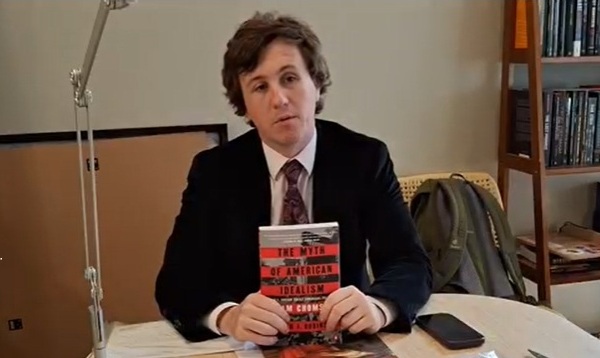KEPW welcomes Chomsky co-author Nathan Robinson
13 min read
Presenter: Nathan Robinson, co-author of a book with Noam Chomsky, visited the University of Oregon in late October and came over to the KEPW studio in Growers Market to talk about the book.
Nathan Robinson: The Myth of American Idealism: How U.S. Foreign Policy Endangers The World. And it is essentially a distilled and I think quite powerful summary of an argument that Noam Chomsky has made for 50 years of public life. So ever since he came into prominence as a critic of the Vietnam War in the mid-’60s, he has been producing work that has exposed the mythologies of U.S. benevolence around the world and the reality of violence, aggression, domination.
[00:00:53] Anyone who’s cracked open a Chomsky book knows that he does so in granular detail, going through all of the statements of press secretaries and heads of state and members of Congress and showing how they obscure the reality of what the United States is actually doing and then comparing it to the actual situation on the ground.
[00:01:15] And, you know, I’ve found his critique so powerful. It was a really important part of my own political awakening during the Iraq War. And I got to know him when I started the magazine.
[00:01:28] Presenter: He started the magazine, which is called Current Affairs, at the end of 2015, early 2016.
[00:01:34] Nathan Robinson: We were told at the time that print is a dying medium that you’ll never succeed in. And that was indeed the prevailing trend. But we had seen the example of Jacobin who had five years previously launched a successful, independent left magazine imprint with beautiful design. And they’d done well, they’d survived, and they’d had very limited external support. They were non-corporate like we were.
[00:01:59] They had a few ads. We don’t have any ads, but we realized if you just have an independent base of subscribers who are loyal and committed and like what you do, you can in fact survive as a print magazine. And we just hit our 56th issue and our 10th year, just added our sixth full-time staff person who is another editor. And we have no signs of slowing down or stopping so far.
[00:02:24] Presenter: His work at Current Affairs led to a correspondence with Noam Chomsky. Nathan Robinson.
[00:02:28] Nathan Robinson: Noam Chomsky became a subscriber and we emailed back and forth and then I realized that there hadn’t been a really good Chomsky book, ’cause he hadn’t produced any new original books for a little while, and so I wanted to help him produce a kind of definitive statement of his ideas on this topic.
[00:02:52] So this book was me working with him to try and go through everything he said over the course of that 50 years and draw the most important insights out of it.
[00:03:01] So, once we had agreed on the structure of the book, I would go and find everything he said about the war in Afghanistan or everything he’d said about Ukraine. And then I would go through it with him and say, ‘What do you think is important? What can be left out here?’
[00:03:16] And then I would kind of edit together a rough, organized version of the things that he had said. And then he would add new material, update it, cut things, and then approve a final draft of each chapter.
[00:03:33] What I found is that when I went through Chomsky’s vast body of writing—and he’s published well over a hundred books, many of which are collections of lectures and interviews, and then there’s all kinds of unpublished lectures. There are whole—there are a couple of YouTube channels that are just old Noam Chomsky lectures.
[00:03:54] And so when I went through this vast corpus of material, a lot of it is analysis of particular wars, particular conflicts. And so in, in the book, there are chapters on particular conflicts, because that is what Chomsky often does, is question the prevailing narrative of, say, the Vietnam War, or the Iraq War.
[00:04:20] But then I also, what I wanted to do was something that he doesn’t often do in his work, which is to ask: ‘Well, what are some of the kind of key points that recur across these case studies? And what’s the takeaway as a whole?’ ‘Cause Chomsky was often commenting on the news of the day, rather than putting forth a big grand theory of American politics.
[00:04:44] We began with what ended up being the title, which is ‘The Myth of Idealism.’ I noticed that across his analysis, one theme that runs through it is the disjunction between the rhetoric of U.S. policymakers about the benevolence of their motives and the evildoing of our enemies, versus the actual reality of what happened in U.S. conflicts, where the morality was at the very least much more muddied than that.
[00:05:20] And then the second point is captured in the subtitle of the book, which is ‘How U.S. Foreign Policy Endangers the World.’ So it’s not just that there are these self-justifying myths that we talk about ‘bringing democracy’ when we are in fact enhancing our own power, but also that the belief in these myths causes us not to notice the ways in which U.S. actions are in fact making the world a much more dangerous place and are causing conflicts that might be avoidable if we were less convinced of the righteousness of U.S. policy, right?
[00:06:02] And so he talked a lot about the potential for a catastrophic war with China. Because U.S. policymakers talk about a threat from China and perceive and tell people they face a threat from China, they act in ways that make war with China ultimately more likely and endanger the world, right?
[00:06:20] So because we see an enemy and act as if we are trying to stop an existential enemy, we thereby bring that enemy into existence and we create a conflict that could be avoidable through diplomacy—if we didn’t swallow these self-aggrandizing myths.
[00:06:38] I have done other books and there’s been no book that has been such a rollercoaster, the production process. It was a dream project for me. He’d agreed to it, but, you know, for a long time we didn’t have a contract. We had to produce a book proposal. He’d never written a book proposal before. Even though he has published 100 books, he’d never written a proposal to a publisher ’cause usually publishers come to him.
[00:07:02] And then, unfortunately, towards the end of the production process, he had a major stroke, which is why he can no longer do public talks and writing. And we were close to the end of the book, so I had to just go in and try and figure out how to end it.
[00:07:17] And people who pick it up and look at the Israel-Palestine chapter for instance, he had been saying for many years that Israel’s policy towards the Palestinians was headed for a cataclysm, essentially, because the U.S. and Israel had declined to grant Palestinians a state and self-determination, because they had thwarted efforts to impose a two-state settlement in the region.
[00:07:47] And he wasn’t alone in this analysis. But he would point out that people who positioned themselves as pro-Israel people, he said they were actually Israel’s worst enemy because they were ensuring that Israel could only remain in a state of permanent conflict with its neighbors, permanent conflict with the Palestinians.
[00:08:09] And he gave a very, very stark and dire warning that the situation was headed for catastrophe. He didn’t predict the exact contours of what happened, that there would be a Hamas attack and Israel would launch this overwhelming genocidal-level response.
[00:08:28] But I don’t think it would’ve surprised him at all what ultimately happened given the warnings that he had been giving for many years.
[00:08:37] His stroke happened before Oct. 7, so I had to write a little postscript on that chapter about everything that happened subsequently.
[00:08:47] It was a really emotional experience, especially knowing that he was not in a position healthwise to comment on it. And so I had to just do what I thought he would want and honor his legacy the best I could. And I felt very proud at having done my best to give him, you know, what seems like it will be his final book and to make it as good as possible.
[00:09:11] Presenter: One of his goals was to introduce Noam Chomsky’s political ideas to a new generation. Nathan Robinson:
[00:09:17] Nathan Robinson: For me, what I wanted to help him do was produce something that really distills his insights in their most powerful form so that other people in a new generation have the experience with it that I had when I was in high school and college where it was just really eye-opening.
[00:09:42] I had a dear friend in high school who was a year older than me, and I don’t know where he encountered Chomsky, but he gave me a copy of Chomsky’s book, Failed States, which came out in I think 2004. And I remember thinking at the time, you know, I don’t know why I need to pay attention to all this analysis about the Middle East and Southeast Asia, you know, I was a teenager. And the book is very heavily footnoted, very dense, very dry. There’s only one picture in the whole book, which is a map of Israel / Palestine. And so it took a while for me to really understand why his work was so valuable. And then when I did, it became very, very important to me.
[00:10:30] He is still the world’s most-cited living intellectual, and his citation rankings are up there alongside Plato, Marx, Hegel, the great minds of prior centuries. He’s one of the only people in our own time, if not the only person who ranks at that level, because he did so much work in politics and also linguistics. And so who could have that kind of dual life that he had? He had a very indefatigable energy, right?
[00:11:00] I don’t know that we’re going to get another Noam Chomsky, but what we are going to get is all of the thousands of people that he inspired, that he spoke with. He spent his whole career going around talking to activist groups. Every day he would respond to any email or letter that anyone sent him.
And so many people that I’ve spoken to after the publication of this book have said, you know, ‘Noam Chomsky gave me an hour of his time when I was in high school’ or college, and ‘I went to interview him for my local paper’ or ‘I picked up this book and it changed my life.’
[00:11:38] And I think that his influence is seen on, for example, Bernie Sanders, whose influence is then seen on Zohran Mamdani. So there is a direct line from Chomsky’s activism and thought to the vibrant flowering of the contemporary left that we are seeing today, even if that’s not always obvious.
[00:12:05] I think we would see a much more intellectually impoverished American left if it were not for the work that he did.
[00:12:14] Presenter: At this unprecedented moment in American history, we asked if Nathan Robinson and Current Affairs had any predictions for what might come next.
[00:12:22] Nathan Robinson: We try and be a little careful in Current Affairs about predictions because in 2016, Current Affairs actually gained a lot of subscribers because we were one of the only publications that said Trump was going to win. Current Affairs published an article that said Democrats are deluding themselves, they are underestimating Trump. They should be running Bernie Sanders against him because Hillary Clinton’s going to lose. Indeed, she did lose and, you know, we took our little victory lap.
[00:12:53] But we’ve predicted other things that have not panned out. And I’ve learned that it’s very hard to predict what’s going to happen in American politics. We wouldn’t have predicted the rise of AOC. We didn’t predict the rise of Zohran Mamdani.
[00:13:11] In fact, I interviewed Zohran Mamdani at the very outset of his campaign when he was, it was considered to be a total long shot, not going to go anywhere. And I was like, ‘Well, good luck,’ (laughs), and I had a conversation with him where I said to him, you know, ‘It’s going to really depress me if this is another one of these lefty campaigns that’s a gadfly campaign, that goes nowhere.’ I said, so I said to him, I said, ‘Please try and win. Please promise me you’ll actually win,’ I said. ‘I don’t want to get excited about a candidacy that’s going to go nowhere.’
[00:13:42] And he said, ‘I promise you I will win,’ which is great ’cause then I watched and I thought, ‘Okay, yeah, he promised me I’ll win.’ And then I watched over the course of the next six months as that campaign, just did what nobody thought it could do. And now he’s almost certain to be the next mayor of New York.
[00:13:58] Everyone’s surprised by it. It’s going to hugely improve the membership and energize the Democratic Socialists of America, the organization he comes from and that’s a very unpredictable thing to have happened.
[00:14:12] We’re really quite excited about Abdul El-Sayed in Michigan who we followed for a long time because he ran for Michigan governor in 2018 and I actually went to Michigan to follow his campaign back then.
[00:14:25] And he did not win the primary then, but he’s running again this time for United States Senate and the political winds have kind of changed. He is someone who is an open champion of Medicare For All. He’s a doctor. He wrote a book on Medicare For All, he is also someone who is very, very full-throated about calling Israel’s action in Gaza genocide and rejecting support from AIPAC.
And whether he’ll succeed or not, we are excited to see someone who has a lot of energy, who’s a very dynamic speaker, who’s very, very smart, running a campaign in a swing state.
[00:15:06] And if he succeeds, it will really expand the possibilities for U.S. politics. ’cause it will show that you can run on a very bold, progressive agenda and win in a state that has gone for Donald Trump in a couple of elections.
[00:15:23] So you might see America sliding towards this very authoritarian and terrifying, cruel brand of nationalist pseudopopulism as represented by Donald Trump. But then there are these countervailing tendencies on the left where we just had the largest single-day protests perhaps in American history against the administration.
[00:15:48] They may in fact be quite weak. They may in fact be totally repudiated in the next midterm elections. And what’s going to happen depends on what people choose to do, and people have free will and agency, so it is very hard to predict what they are going to do. So there are a couple of directions that things could go…
[00:16:09] To return to the famous theme of his 1967 essay, The Responsibility of Intellectuals, in which he talks about the obligations that each of us have by virtue of our positions in the world, whatever privilege we have, whatever status we have and he was writing in that essay about the obligations that intellectuals had during the Vietnam War to expose the lies of the administration and to denounce a war that was fundamentally immoral.
[00:16:41] He’s always made the case and I think put into practice himself that we, each of us have duties and that knowledge can of the immoral actions of our government confers an obligation to try and change it.
[00:17:00] And he is also always had a really strong belief in the power of activism to change the world. When we’re looking through this catalog of horrors from American history for the last 60 years, one of the central lessons of Chomsky’s work is that once we know about these things, we have to do something to try and prevent them to try and stop them while they’re happening, like the Palestine encampments have done and to try and prevent future ones from happening. So that sense that ordinary people have the capacity and the obligation to act is something that comes across from Chomsky’s work very strongly.
[00:17:42] Presenter: Nathan is not the only contributor or editor at Current Affairs with a book out in your local neighborhood bookstores.
[00:17:48] Nathan Robinson: One of our writers, Sam Miller McDonald, has just put out a book called Progress: A History of Humanity’s Most Dangerous Idea, which is a critique of the concept of progress and how it’s been used to justify atrocities. It pairs very well with The Myth of American Idealism.
And then, Natasha Hakimi Zapata has put out A Better World is Possible and that is a survey of policies and programs in social democratic countries around the world as a kind of template for things that the United States could do if we wanted to have a more just and fair society.
Another one of our contributors, Alberto Medina, just got a book deal based on his Current Affairs article on why Puerto Rico should declare independence from the United States, called Free Puerto Rico, is his book coming next year.
[00:18:41] Presenter: We visited with Nathan Robinson. His book with Noam Chomsky introduces a new generation to the recurring themes in Professor Chomsky’s books, lectures, and statements over 50 years as a public intellectual.
[00:18:53] Nathan Robinson: We finally got the paperback out, exactly a year after the original hardcover was released. So now it’s available in a more compact and affordable edition for only $20 U.S. at your nearest neighborhood bookstore.
[00:19:09] I’ve been in bookstores all over the country. There are bigger bookstores. Like there’s a Half Price Books in Dallas the size of a Walmart.
But I went in Smith Family Books here in Eugene and I have officially declared it the best bookstore I’ve ever been in because nowhere have I seen that balances really good prices, really good selection, very good organization. Everything’s beautifully organized. Everything’s very clean and well kept, and I saw so many things I wanted to buy in there. It was very hard not to come back with a giant stack.
[00:19:46] Presenter: The book is titled, The Myth of American Idealism, How U.S. Foreign Policy Endangers The World.




